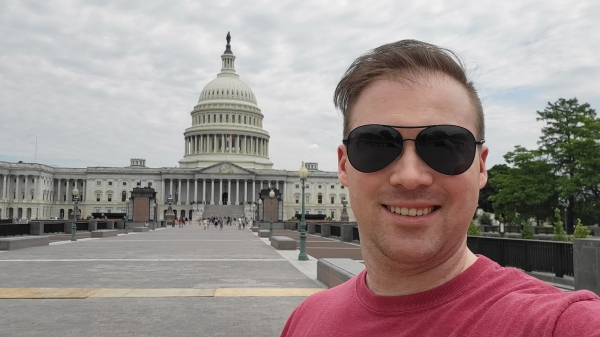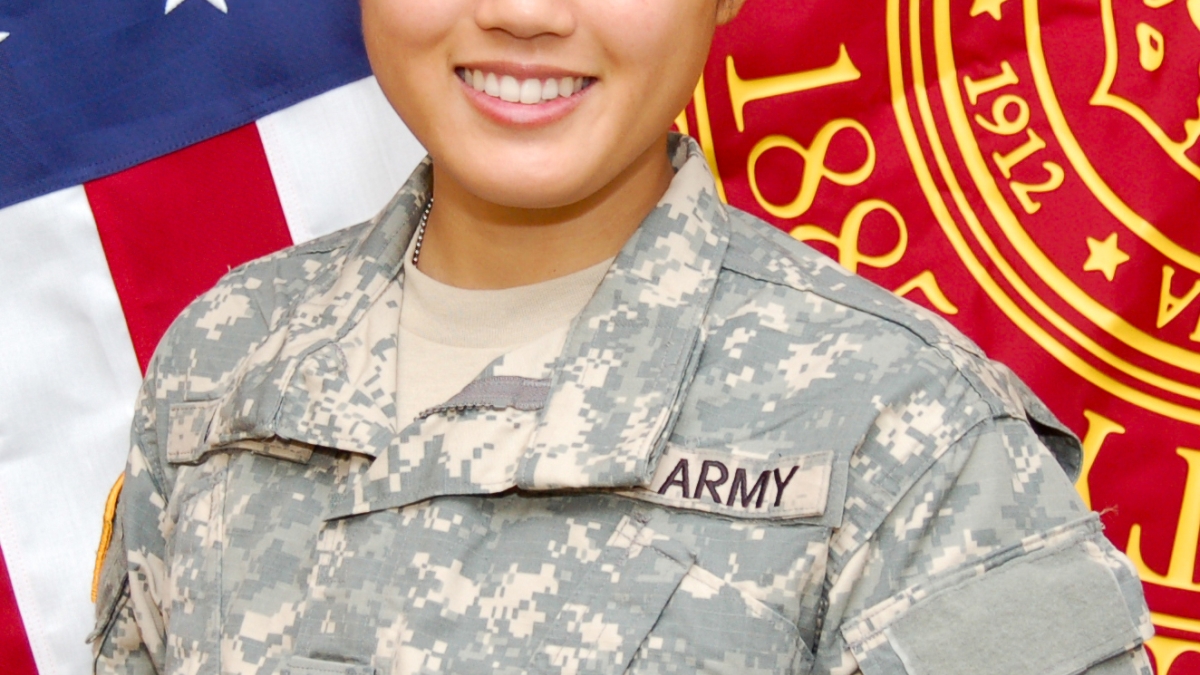Family helped pave the way for Arizona State University Army ROTC Cadet Daina Nicole Cing, who will carry on her family’s tradition of serving in the military when she commissions as an officer in the U.S. Army Reserve.
The family’s history of service started with her grandfather, who served in World War II. Now Cing will be the third generation to serve in the military.
“I would say that my grandfather’s World War II service is what set that family tradition of passing down that torch of service,” said Cing.
Cing’s uncle served in the Marine Corps and her mother originally enlisted in the Air Force and then transitioned to the Army where she eventually commissioned as an Army officer.
Although family legacy played a large part in Cing’s decision to join the Army ROTC program, she knew from a young age that she wanted to be of service to others. When Cing was a kid she hated seeing other people be bullied or taken advantage of and would stick up for others whenever she had the chance to.
“I’ve always wanted to help others and now that I’m an adult I realize that it comes in different forms,” said Cing. “I definitely want to give something back to my country. My grandfather was fortunate to become an American citizen and I definitely have a good life. Part of that comes from the benefits of my family’s military background, which has helped provide me with a good education and the experiences of moving to places all over the world, so I see it as a privilege to be able to give back to my country and my family.”
This May, Cing, a Talofofo, Guam native, will receive her bachelor’s degree in political science and commission as an officer in the U.S. Army Reserve.
Q: What was your “aha” moment, when you realized you wanted to study the field you majored in?
A: The moment I realized biochemistry was not my forte. I was a biochemistry major for three years and it was because I originally wanted to be a doctor and attend medical school. Didn’t happen. I have a great appreciation for the sciences but it seemed like political science was a better fit for me because I’ve always been interested in how different political systems impact each other as well as the relationship between governments and the people.
Q: What’s something you learned while at ASU — in the classroom or otherwise — that changed your perspective?
A: Humility. I’d like to think that I’m not an arrogant person because I believe that everyone has a lot to learn every day from others. I think coming to ASU and meeting so many different people from different backgrounds keeps me on my toes and teaches me that I always have something to learn from everybody. It’s humbling to just sit and listen to peoples experiences.
Q: Why did you choose ASU?
A: I actually transferred from Colorado State University to ASU. My parents were moving from Colorado to Arizona. I literally had a week to decide if I wanted to follow them. It was all last minute but it worked out. I decided to follow them in order to save some money while I finished school. I also wanted a change of scenery and I guess being a military dependent growing up kind of got me used to moving every three years.
Q: What’s the best piece of advice you’d give to those managing school and Army ROTC?
A: Know your syllabus and have a planner that works for you. I have professors and mentors that all tell me to read ahead in the syllabus. What I do is find all of the assignment due dates and write them down in my planner so that I always know when something is due. It saves you from a lot of stress. Having a support system is also very important. I have to say that my family, fiancé and faith are my great support system. They hold me accountable and help me destress.
Q: What was your favorite spot on campus, whether for studying, meeting friends or just thinking about life? And why?
A: Technically it’s not on campus, but it’s right off campus. It’s called Cupz Coffee Shop. The staff is so friendly, they let me just order my coffee and sit there and study all day.
Q: What are your plans after graduation?
A: Shortly after graduation I’m getting married and after that I’m headed to the Army’s Basic Officer Leadership Course. During the summer I’d like to get acquainted with master’s degree programs that I can pursue online. I’m looking into cultural anthropology or archaeology which isn’t quite political science but I think that’s where my interest is.
Q: If someone gave you $40 million to solve one problem on our planet, what would you tackle?
A: There’s a lot I would want to tackle but if I had to pick one the $40 million would go to the environment. I’m from an island in the Pacific, so just knowing that those areas can really be affected by the rising temperatures and rising waters. Just the thought of the environment getting so bad that I might not have a home to come back to is something that really concerns me. The environment is something we all share and whether the money went toward research or coming up with more sustainable solutions I think it would be well spent.
Written by Christopher Farrington, ASU Department of Military Science
More Sun Devil community

ASU grad finds purpose in public policy and service
When Bryson Jones took an AP government class back in high school, he found himself fascinated by the machinery of government and…

First-generation college student dedicates career to improving students' experiences in STEM
When Erika Nadile was a kid, she dreamed of being the first in her family to go to college. But she wasn’t sure that dream was…

Foster youth and the unhoused find champion in MBA grad
Brodie Butler began her academic career as a premedical student, but it wasn't long before she discovered her true passion:…
